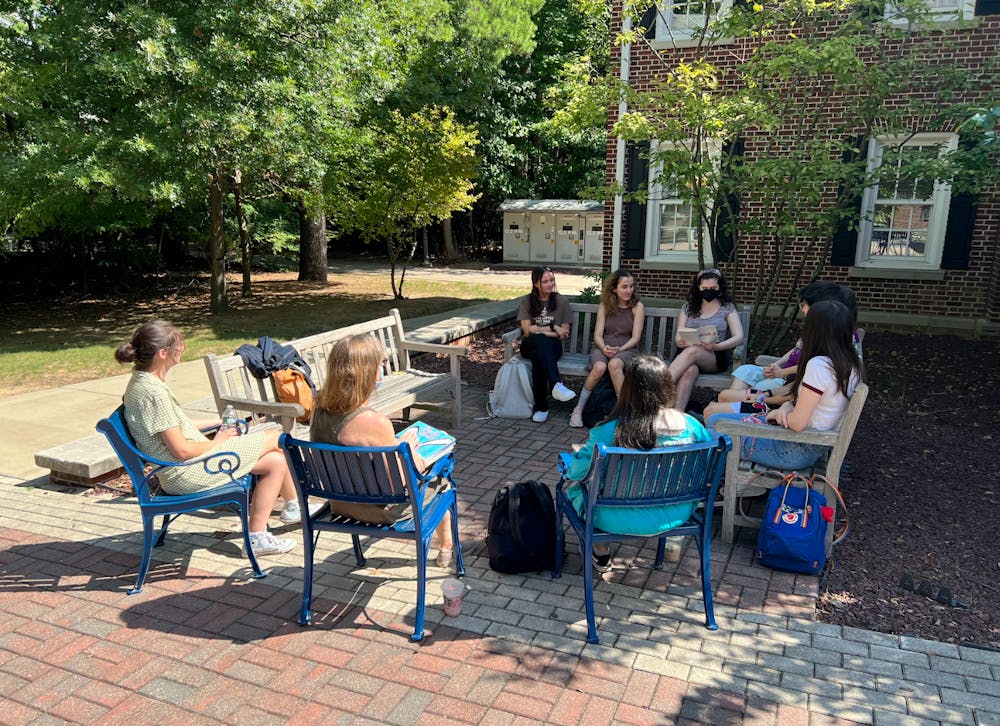By Roshni Dave
Correspondent
In recent years, the debate over banned books has exploded in places like school board meetings, libraries and state senates, resulting in legislation restricting the books allowed in public libraries and K-12 schools.
According to the American Library Association (ALA), books are pulled from shelves under the guise of protecting children from sexually explicit content, LGBTQ+ content, critical race theory, anti-police propaganda and indoctrination into social agendas.
Every year, ALA puts together a list of the top 10 most challenged books. Banned Books Week celebrates and brings awareness to those books.
From Sept. 19 to Sept. 23, Sigma Tau Delta, the English Honors Society, chose six banned books from the top 10 list over the years to dispute the practice.
The number of banned and challenged books has significantly increased over the past year. In 2019, there were 377 challenges and 566 books targeted, compared to 2021’s 729 challenges and 1,597 books targeted.
The jump in challenges and bans is concurrent with the United States’ current divisive political landscape, in which some view education about the experiences of Black and LGBTQ+ individuals as wrong..
Rudine Sims Bishops’ concept of mirrors, windows and sliding glass doors was a theme discussed at the events against bannings. The overall idea is that literature is viewed through three lenses: mirrors, or books in which people can see themselves, and windows and doors or books that people can see and experience other’s life experiences.
“Kids are going to grow up to be whatever they want to be, and if a book helps them realize that, then that’s a wonderful thing that that child gets to see themself in someone else’s narrative,” said Matthew Chinique, a sophomore English and secondary education major and Sigma Tau Delta’s treasurer. Chinique was also a student presenter.
Chinique added that some books expose children to new ideas that might change something for them.
“I think it’s all about really just learning and being open to new experiences,” said Chinique. “So banning a book, all it does is prevent learning and prevent those new experiences, and that’s just going to homogenize culture and create more biases.”
Dr. Emily Meixner, a professor in the English department, began the week with “Something Happened In Our Town” by Marianne Celano, Marietta Collins and Ann Hazzard.
The book follows a conversation between a young white girl and her family and a young black boy and his family and their questions about a police shooting of an unarmed Black man in their community. The target audience is children 4-8 years old. The book’s purposes include encouraging conversation about race, linking past racism to modern-day racism and teaching children how to counter racial injustice when they encounter it. These purposes are all clearly outlined in the book, from the list of ways to talk with children and answer their questions about race to outright linking past slavery and segregation to modern-day racism. This book was banned because it was thought to promote anti-police views and divisive language.
Tuesday’s book was “Melissa” by Alex Gino, presented by junior Sigma Tau Delta president and elementary education and English major Megan Finan. “Melissa” is a middle-grade book about a trans girl in late elementary school. This book was banned because of LGBTQ+ content every year that it was banned and because “schools and libraries should not ‘put books in a child’s hand that require discussion,’” according to ALA. Presenters read the first chapter and discussed the connection between how Melissa was constantly being trained and taught to act like a boy through gender stereotypes and compulsory heterosexuality.
Wednesday’s books were “The Hate U Give” by Angie Thomas and “Stamped” by Jason Reynolds and Ibram X. Kendi. Professor Kristen Luettchau chose to present these books together because the historical context that “THUG” relies on is explained in “Stamped.” “THUG” was banned because of anti-police messages and “Stamped” because it “does not encompass racism against all people,” according to ALA. The conversation at this presentation focused on the Prison Industrial Complex and how these books are meant to introduce empathy and different modes of thought, and how that looks relative to mirrors, windows, and sliding glass doors.
Thursday's book was “The Bluest Eye” by Toni Morrison, presented by Dr. Glenn Steinberg. This book has been banned because of depictions of child abuse and explicit content.
Chinique rounded off banned books week with the only graphic novel chosen, “Fun Home” by Alison Bechdel. The novel is about her experiences growing up and coming to terms with her sexuality and relationship with her abusive father. The book was banned because of its explicit content and themes of homosexuality, graphic content and sexuality. The conversation centered around how themes in the novel are present in real life. This includes the explicit content in the book that had a hand in getting it banned. Mirror, windows and sliding glass doors came up in this discussion with this text through how for queer readers, this book could be a mirror, but for non-queer readers, it can be a window and sliding glass door.
Sophomore English major and attendee Marni Moise Kleinman responded to why books should not be banned in schools.
“Education-wise, we want to face problems instead of pretending they don’t exist,” Kleinman said.







